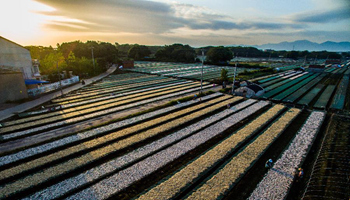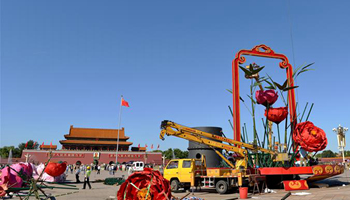OTTAWA, Sept. 20 (Xinhua) -- China-Canada relations have improved steadily since last year, and the two sides will take advantage of Chinese Premier Li Keqiang's visit to Canada to expand the scale of bilateral economic and trade cooperation, said Chinese ambassador to Canada Luo Zhaohui.
Canadian Prime Minister Justin Trudeau kicked off a visit to China with stops in Beijing and Shanghai before attending the G20 Summit held in the eastern city of Hangzhou. Premier Li's official visit to Canada later this week comes within less than a month of Trudea's trip to China.
"Such a frequent exchange of visits in a short period of time is indeed rare in the history of China's foreign relations," Luo told Xinhua.
Despite some previous setbacks, China-Canada ties have improved steadily since the Liberal Party of Canada took office last November, which can be summarized in four ways, Luo said.
The first involves political exchanges between China and Canada.
Last November, Chinese President Xi Jinping met with Trudeau on the sidelines of the G20 Summit held in Turkey and suggested building a long-term, healthy and stable strategic partnership with Canada on the basis of mutual respect and win-win cooperation.
Last October, Li congratulated Trudeau on his election as Canadian prime minister after his Liberal Party won a landslide victory in Canada's federal elections.
During his first official visit to China and his attendance at the G20 Hangzhou Summit earlier this month, Trudeau enjoyed a high-level reception and hailed a new era in China-Canada relations. The two countries also agreed to establish an annual dialogue between the Chinese premier and Canadian prime minister.
Secondly, pragmatic cooperation between China and Canada has achieved steady growth.
China is Canada's second largest trading partner, a source of imports and a market for exports. Last year, bilateral trade reached 55.7 billion U.S. dollars, more than 370 times the amount at the beginning of diplomatic ties decades ago.
During his China tour, Trudeau also announced Canada's decision to apply for membership at the Asian Infrastructure Investment Bank and signed dozens of cooperation deals with China.
"Thirdly, people-to-people and regional exchanges between the two countries are improving," Luo said. The government of the province of Nova Scotia, dubbed the "Atlantic Gateway," recently released its China Engagement Strategy. In an unprecedented move between two provinces, Guangdong Province and the province of British Columbia jointly inked agreements to mutually support the Belt and Road Initiative and the "Pacific Gateway" strategy. The Belt and Road is China's massive initiative to create land and maritime trade routes throughout Asia, parts of Africa and Europe.
Last year, nearly 1.3 million visitors traveled between both countries. The number of Chinese studying in Canada and Canadians studying in China was a combined 150,000. The leaders of the two countries have also announced 2018 as the year of China-Canada Tourism, an agreement which also includes adding seven Canadian visa application centers in China.
Fourthly, the two sides share similar ideas regarding development, Luo said. China's five development concepts, involving innovation, green growth and the Belt and Road Initiative, complement the new Canadian government's plans for innovation, a green economy, assisting Small-and-Medium Enterprises (SMEs) and expanding infrastructure, which give both sides more opportunities to push forward mutually-beneficial cooperation.
"China-Canada relations have recently moved onto the fast track," Luo said, attributing the improvement to three factors. First, both governments attach great importance to promoting mutual ties. Second, both believe in the need to counter rising protectionism that threatens the global economy. Third, China and Canada continue to witness increasing coordination at the United Nations, the G20 as well as on climate change and elsewhere.
The recent exchanges between China and Canada provide a perfect chance to boost bilateral trade, advance free-trade negotiations and strengthen coordination in global governance, said Luo. "I'm confident we will witness a glorious chapter once again in China-Canada relations."










